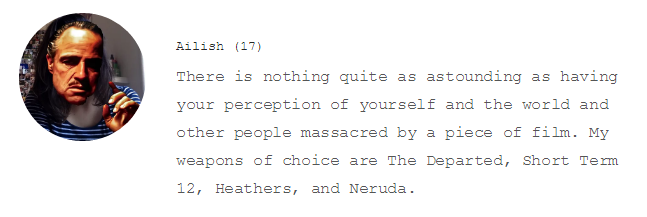Response by Ailish.
Do you believe in fate?
I believe in everything.
In God?
I am not speaking to him.
Starless Dreams stays with the viewer as a string of quotes, a tunnel of echoing voices in their ears, of those who are too often silenced.
In Starless Dreams Mehrad Oskouei visits a female juvenile correctional facility in Tehran, capital of the Islamic Republic of Iran. In the facility there are teenage girls who have committed crimes ranging from theft to murder. In between scenes of day-to-day minutia – a snowball fight rages, frozen-solid clothes are plucked from the clothesline and brought inside – Oskouei pries from the soldered jaws of inmates stories of why they are at the facility. As the film progresses the audience is guided through different interactions the girls have with each other, with their religion, with their families. With varying degrees of anonymity and individualism, the statements of ‘651’ and ‘Nobody’ are shared alongside those of Masoumeh and Khaterah but as the film progresses the accounts of the girls reveal tragic patterns of violence, sexual abuse, drug abuse, and addiction. Starless Dreams is extraordinarily personal, and emotionally provocative in its cross-section of troubled youth and girlhood under political oppression.
It is difficult to try and paint a picture of this film without simply cutting together some of my favourite quotes from the different girls. The astonishing maturity, sobriety, grace, and wit with which these girls speak about their own experience is unparalleled in my anecdotal experience of teenage dialect and speech pattern. On two particular occasions I’m afraid there is simply nothing that can accurately exhibit the flooring effect of these girls’ dialogue than verbatim.
The girls share meals at a crowded dining table in the centre of their living quarters. Tonight morale is high as they have ordered from the local pizzeria. The girls take control of their narrative by both pulling the boom into shot and using it as a stage microphone to belt out a song of suffering and bitterness, which the girls laugh along to. In the next shot, Nobody, with a candle as a play microphone, interviews her fellow inmate Masoumeh, who lead the singing.
If you had a daughter, what would you name her?
A daughter? I would kill her.
Would you also kill a son?
A son is a crown on his mother’s head.
Oskouei interviews a pregnant seventeen-year-old in her bottom bunk. She confesses she could never be the good daughter her mother wanted her to be. The camera pans up to her bunkmate, who is crying.
651, why are you crying?
Her story is the same as my story.
Throughout the entire film the audience is made privy to the lives of these young women. They act as sisters towards one another, they live and work with one another and, save the horrendous tragedies they bear is not difficult to imagine them as Western girls. The context, however, of present-day fundamentalist Iran looms in the background, encasing each girl symbolically in the head covering they are required by law to wear. It seems as though each girl has a story of a male family member (oddly enough, ‘aunt’s husband’ seems to be the most popular) ‘bothering’ them, a verb that seems to refer to any kind of physical or sexual abuse, most of which their families do not believe. These underlying political themes rise to the surface in the final quarter of the movie, when, for the second time on-screen, their imam khatib visits. They pray, and afterward a sort of question forum opens, and a flood of questions pour from the girls. They ask their imam for an explanation, a justification, for the oppression of their gender, but its clear they don’t expect satisfaction. These girls reveal themselves to be anything but clueless of their status as women of Iran, and of the fragility of reason on which it stands. This movie is about girlhood in struggle, and neither the inmates nor Oskouei are willing to shy away from the political aspects of that.
Nobody puts it best when, in the wee hours of the morning, she speaks with Oskouei:
What do you think about your future?
I’ll die in the gutter one day.
Don’t you want to fight for a better life?
Society is stronger than I am.
Starless Dreams is an emotive depiction of young women who, being dealt an unlucky hand by life and having society twist the knife, find both refuge and capture in the flawed criminal justice system of their country, which sees them in prison whilst others perhaps more responsible walk free. Deeply intimate and unwaveringly honest, the movie should be a staple for anyone invested in the future welfare of girls everywhere.
Antenna International Documentary Film Festival

